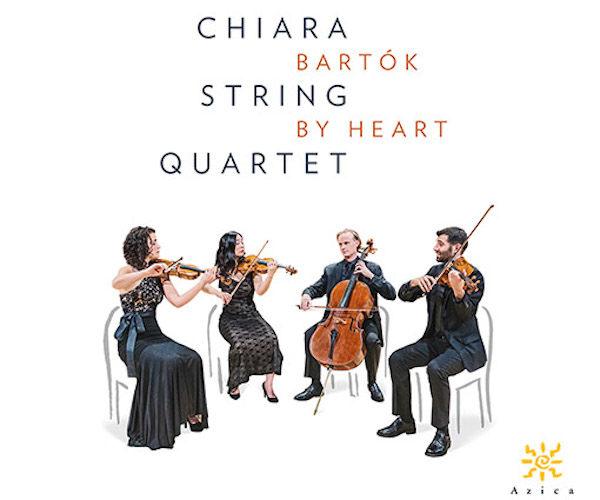Classical CD Review: The Chiara String Quartet Plays “Bartók by Heart” (Azica Records)
The Chiara Quartet has recorded a series of gritty, compelling takes on Bartók’s seminal group of quartets.

By Jonathan Blumhofer
For solo musicians, performing from memory is largely standard procedure, but it’s hardly par for the course for chamber ensembles. The Chiara String Quartet, however, has made a habit of doing just that, and the results – as demonstrated on their new recording of the complete Bartók string quartets – are remarkable. Bartók by Heart is no gimmick: there’s nothing in the least contrived about it. Quite the contrary. The Chiara’s is a richly nuanced, invigoratingly-played cycle.
You get a sense of this from the very opening bars of the Quartet no. 1’s first movement. The first two Bartók quartets might not be quite as obsessive as a Mahler symphony when it comes to details of articulation and dynamics, but they definitely head down similar paths. From the opening fugal movement, every swell, sigh, tenuto, and accent in this First Quartet is thoughtfully shaped and strikingly realized. The consequence is a reading of organic logic and seething energy: the music comes to life in an almost literal way.
The same is true of the Second Quartet. In this reading of one of Bartók’s darkest, most violent scores, the Chiara’s here offer up a performance of the first movement that’s desolately serene. The Emerson Quartet might have played the closing section of the middle movement a bit more manically, but the Chiara’s take on the whole is deliciously impellent and the finale wraps everything up in a bleak chiaroscuro.
The biggest benefit of playing from memory – internalizing the music and performing it from a place of deep knowledge, comfort, and musicality – pays its biggest dividends in the Chiara’s readings of the last four quartets. Even more than the first two, these scores are feverishly contrapuntal and aggressively motivic. Understanding how all the parts fit together and speak can only come from extended (and extensive) time with the music, and the Chiara’s have clearly put in that time.
In the Third Quartet, they distill all the score’s materials down to its essence. It’s not cold music, by any means, but there’s a directness to the playing that clearly emphasizes the leading motives (Hauptstimmen, as Schoenberg might have put it) while not making too much of the Quartet’s background gestures. Thus, as foreground and background materials exchange – for instance, when the scalar fragments of the “Introduzione” turn into the first theme of the “Seconda partie” or when the glissandos become increasingly prominent and threatening – there’s a visceral sense of musical development as well as a clarity of expressive purpose that pushes this recording of this Quartet to the top (or near the top) of the pile.
Similar observations can be made of the Fourth Quartet, with its brilliant evocations of folk music. Yes, it’s uncompromisingly dissonant music, but, when played like this, it’s above all deeply humane. Besides, as a performance, this reading simply dazzles. The insanely vigorous second movement is played with breathtaking assurance and the devastating “night music” of the middle movement sings with abundant feeling.
The Fifth and Sixth Quartets alternate light and shade, the Chiara’s navigating Bartók’s complex rhythmic mazes in both with lots of character (the first movement of the former downright swings) and they ably mine the resigned weariness of the Sixth.
In all, the Chiara’s give here a series of gritty, compelling takes on this seminal group of quartets. Expressively, everything works, though it will be interesting to hear their interpretations of these works grow over time. Technically, there’s nary a shortcoming.
Jonathan Blumhofer is a composer and violist who has been active in the greater Boston area since 2004. His music has received numerous awards and been performed by various ensembles, including the American Composers Orchestra, Kiev Philharmonic, Camerata Chicago, Xanthos Ensemble, and Juventas New Music Group. Since receiving his doctorate from Boston University in 2010, Jon has taught at Clark University, Worcester Polytechnic Institute, and online for the University of Phoenix, in addition to writing music criticism for the Worcester Telegram & Gazette
Tagged: Azica Records, Bartok By Heart, Bartok String Quartets
